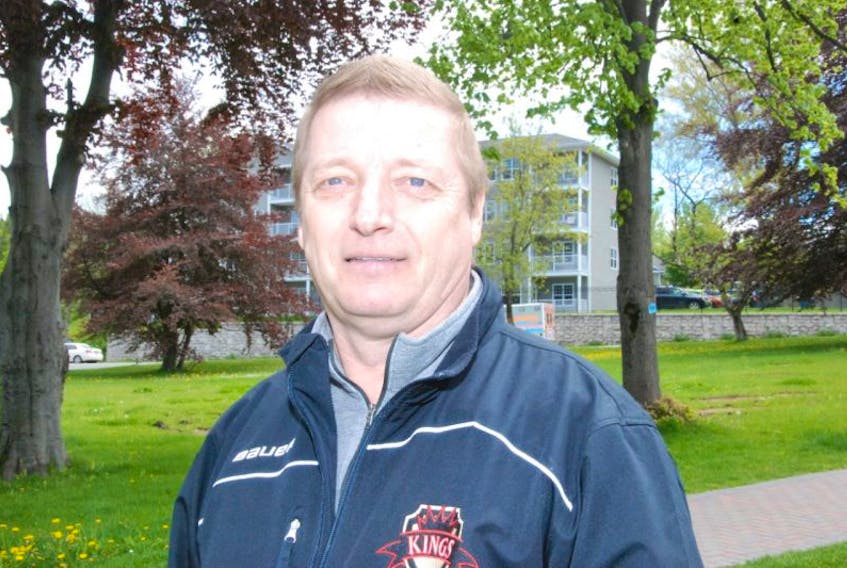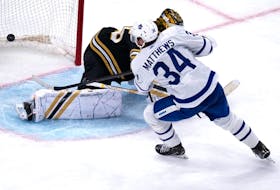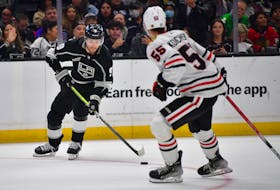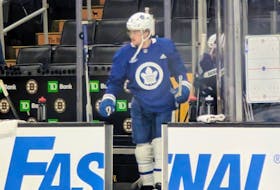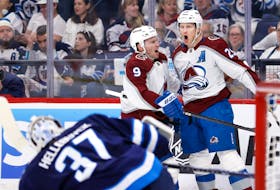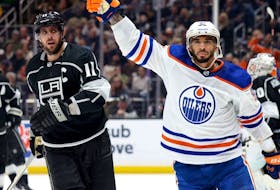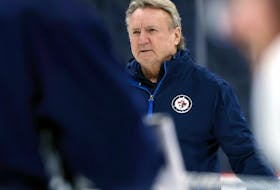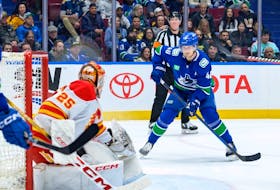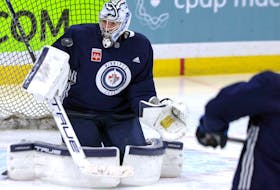He remembers seeing stars, but he never experienced serious symptoms such as headaches and sensitivity to light, and he didn’t miss any school time.
Looking back on it all, he just figures he could have been subjected to a mild concussion and thought no more of it.
Things have certainly changed.
Player safety is important to him more than ever because he is a coach in the Corner Brook minor hockey system, serving this past season as an assistant coach with the Western Kings of the provincial AAA bantam hockey league.
His son Jesse was diagnosed with a concussion last winter and was kept out of competitive hockey for a six-week period so he knows a thing or two about the challenges and concerns that come with such a diagnosis.
Hickey is giving a big thumbs up to Hockey Newfoundland and Labrador’s decision to lay out a concussion awareness and recognition campaign for the 2017-2018 hockey season.
“I totally agree with it and totally support it,” Hickey said earlier this week.
His son came off the ice after a shift during a game last winter and got sick on the bench. According to Hickey, nobody on the bench saw anything happen out of the ordinary on that particular shift so there didn’t seem to be anything to worry about.
His son has been dealing with allergies and asthma attacks for years so Hickey just thought this was the cause for his boy being sick.
But, his son only took one shift before coming back to the bench and chatting with his dad. This is where coach Hickey realized it was time to remove his son from the ice.
His boy passed out in the dressing room afterwards so then it became clear that a concussion may be the cause of his sickness.
He would end up missing nine days of school and four weeks of hockey with his teammates. He was cleared by doctors to return to the ice after four weeks, but Hickey wasn’t willing to put his son at risk so he kept him off the ice for an extra two weeks.
“I did it for his safety. I wanted to be sure,” he said. “I said if he’s going to go back and be fine then it’s not going to be on me because I initially felt bad when it all happened.”
Dr. Jared Butler, medical advisor to Hockey Newfoundland and Labrador and HNL vice-president and safety officer Murray Roberts, were the driving forces behind bringing the campaign to fruition.
According to Dr. Butler, the tool was developed by the International Concussion Working Group, a group of physicians from all over the world who meet every four years at various venues to discuss the latest advances in concussion management and recognition in what he described as a Consensus Conference. The group met in Berlin back in November, he said, and out of that came the protocol for the newest tool Concussion Recognition Tool 5.
“On the back of every dressing room door and on every bench in every rink across Newfoundland and Labrador there will be a copy of this tool,” Dr. Butler, who is Chief of Family Medicine for Central Health in Grand Falls-Windsor, told The Western Star earlier this week.
Hickey is happy to see the provincial hockey organization forge ahead with initiatives geared towards keeping players safe on the ice, but he believes other groups should follow suite by creating the same awareness for other sports from baseball to soccer to ensure all children have a safe environment to play in.
He believes parents and players have to be educated on the subject and suggests creating awareness in the school system through physical education classes.
His son is doing much better today. But, he also knows there could have been a different outcome so he will continue to support those who put the safety of the players first and foremost on their agenda.
Information courtesy Hockey NL
Hockey Newfoundland and Labrador’s Concussion Recognition Tool
Recognize and Remove
Concussion should be expected if one or more of the following visible clues, signs, symptoms or errors in memory questions are present.
1. Visible clues of suspected concussion
Any one or more of the following visual clues can indicate possible concussion:
· Loss of consciousness or responsiveness
· Lying motionless on ground, slow to get up
· Unsteady on feet, balancing problems or falling over, incoordination
· Grabbing or clutching of head
· Dazed, blank or vacant look
· Confused or not aware of plays or events
2. Signs and symptoms of suspected concussion
Presence of any one or more of the following signs & symptoms may suggest a concussion:
· Loss of consciousness
· Seizure of convulsion
· Balance problems
· Nausea or vomiting
· Drowsiness
· More emotional
· Irritability
· Sadness
· Fatigue or low energy
· Nervous or anxious
· “Don’t feel right”
· Difficulty remembering
· Headache
· Dizziness
· Confusion
· Feeling slowed down
· “Pressure in head”
· Blurred vision
· Sensitivity to light
· Amnesia
· Feeling like “in a fog”
· Neck pain
· Sensitivity to noise
· Difficulty concentrating
3. Memory function
Failure to answer any of these questions correctly may suggest a concussion.:
· “What venue are we at today?”
· “Which half is it now?”
· “Who scored last in this game?”
· “What team did you play last week / game?”
· “Did your team win the last game?”
Any athlete with a suspected concussion should be IMMEDIATELY REMOVED FROM PLAY, and should not be returned to activity until they are assessed medically. Athletes with a suspected concussion should not be left alone and should not drive a motor vehicle.
It is recommended that, in all cases of suspected concussion, the player is referred to a medical professional for diagnosis and guidance as well as return to play decisions, even if the symptoms resolve.

